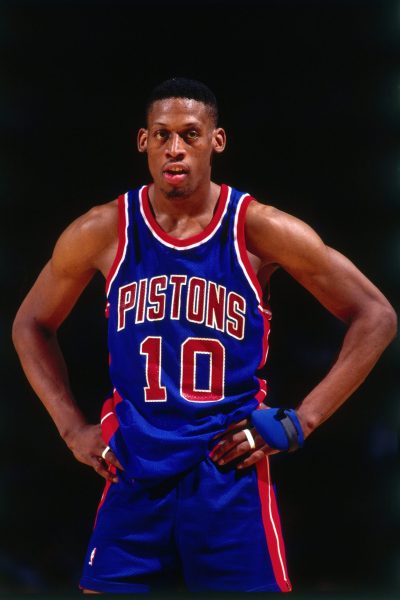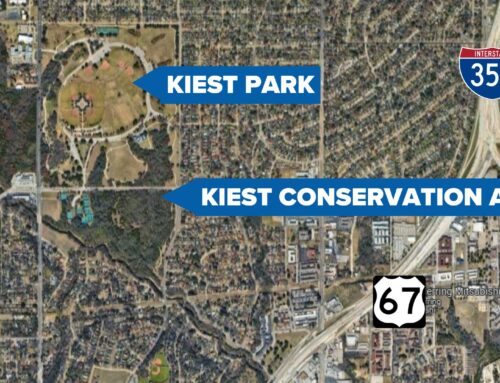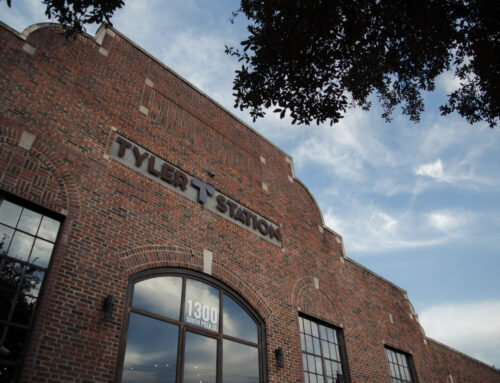Hard to believe at one point in time, basketball Hall-of-Famer and fashion icon Dennis Rodman walked the slums of Oak Cliff without anyone batting an eye. According to his autobiography, 1996’s As Bad As I Wanna Be, he was more used to being beat up or pushed to sell drugs than expected to get himself out of the ghetto and into the history books. But last week, the Oak Cliff native was named to the NBA 75th Anniversary Team. Born in Trenton, New Jersey, Rodman grew up in Oak Cliff with his two sisters and single mother during the late 1970’s and early 80’s. Rodman attended South Oak Cliff High School where he was on the basketball team, but barely played due to being benched or cut most years.
It wasn’t until he entered college at Cooke County College (now North Central Texas College) where he experienced a growth spurt, shooting up from 5’11 to 6’7. Both of his sisters also played for SOC. Kim and Debra would go on to be All-Americans at Louisiana Tech and Stephen F. Austin, respectively. Debra showed the family basketball genes by winning two national titles with the Lady Techsters.
In both of his two autobiographies, including Walk on the Wild Side, Rodman speaks of an Oak Cliff long before gentrification hit. One filled with danger lurking around every corner. But also one which shaped Rodman into the man he would become. Terrified of the outside he retreated within. By doing so, got to know himself. He created the seeds of what would become an icon on and off the floor. The humility he learned served him while working as a janitor at DFW Airport would continue while in the NBA, filling the ultimate blue-collar role: defending like a madman and rounding out to be one of the, if not the, greatest rebounder of all-time. While with the Pistons, Rodman would be a two-time All-Star and two-time Defensive Player of the Year.
After leaving the Detroit Pistons with two championships and a hard-nosed reputation, he went to San Antonio, another place he hated according to his biography. He played next to the squeaky-clean image and personality of All-Star David Robinson. But it was there the multi-colored hair, piercings and attitude Rodman would be known for was born. He would spend two years in San Antonio before heading to the Chicago Bulls, joining Michael Jordan, Scottie Pippen and Phil Jackson, where he would win three more championships from 1995-1998.
While playing, Rodman would have a high profile friendship with Eddie Veder, the lead singer of his favorite band, Pearl Jam and romances with stars like Madonna. He even married Baywatch star Carmen Electra for a total of nine days. What made Rodman special was he lived his life his way. For his happiness and pleasure. He inspired a different idea of what a basketball player could be. He was a champion of those living with AIDS and HIV, the queer community, and mental health awareness.
He has also held controversial friendships with North Korean dictator Kim Jong-un and supported Donald Trump and Kanye West for presidency. This was part of what made Rodman special. He never gave a darn what anyone said, ever. He continues to live his life the way he wants, without compromise and, in a way, that’s the Oak Cliff attitude that makes the neighborhood special.
On the court, Rodman would finish his career as a seven-time All NBA Defensive First Team, seven time rebounding championship, and two-time All-NBA Third Team, going down in history as one of the greatest defensive players of all-time, while standing only 6’7. He would also finish with career averages of 7.3 ppg and 13.1 rpg. His last stop in his 20 year NBA career would be back home with the Dallas Mavericks, as the first move Mark Cuban made after buying the team, trying to pump histrionics back into a tired franchise. In typical bad boy fashion, Rodman apparently wanted to wear the No. 69, but was nixed by the league and then commissioner, David Stern. Cuban keeps the only made version of the jersey in his office.






